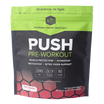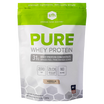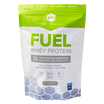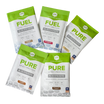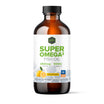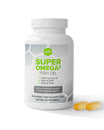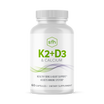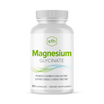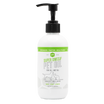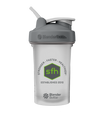Inflammation 101: What Causes It & How To Fix It

You fall and twist your ankle and it swells to the point where you’re limping. You overdo it with the deadlifts and can’t raise your arms the next day. Or you just drive yourself a little too hard with a long workout that spurs on some free radical damage, leading to serious aches and pains in your joints, muscles, and ligaments the next day.
In all of these cases, all that pain you’re feeling is likely caused by inflammation.
Inflammation is a good thing under certain circumstances: in fact, it’s a big part of your immune system’s way of keeping you healthy. But unfortunately, this inherent immune response can also go awry sometimes, leading to more harm than good. Let’s discuss everything you need to know about inflammation, including the good, the bad, and what you can do to keep it under control.
What is Inflammation?
Why exactly does your body start to swell when the pressure is on? It all comes down to inflammation. Inflammation is the body’s way of healing itself. When you have inflammation, your body is in the process of fighting off infections or repairing injuries.
Here’s how this works: when your immune system senses a problem it responds by pumping blood to the area in question and releasing a surge of white blood cells, leading to swelling. This response is called acute inflammation. While acute inflammation generally does cause some discomfort (think the pain and tenderness you feel in an injured area), this is actually a good thing because it’s a sign that your body is fighting those infections. When the injury is repaired, acute inflammation subsides.
When Does Inflammation Become A Bad Thing?
While inflammation is often very necessary, this life-saving immune response can also sometimes go away.
Under certain circumstances, your immune system can respond inappropriately with inflammation, even if there aren’t actually any acute dangers present. In these cases, your immune system can actually attack your body’s own healthy tissues and joints instead! This inappropriate inflammatory response is known as chronic inflammation.
Chronic inflammation is often a sign that something is amiss, and is low-grade and constant. In other words, your immune system is being triggered consistently by something that it interprets as a threat. Ultimately, this can lead to your nerves and tissues becoming stressed out and, at worst, damaged.
Case in point: your stiff and sore joints after a particularly strenuous workout might cause you to hobble around and keep you off the playing field for a couple of days until you recover. But constant, chronic inflammation can do longer-term damage on that joint, which can then go on to affect other body parts.
Your sleep quality also seems to be linked closely to inflammation. While more research needs to be done to determine whether inflammation causes sleep issues or vice versa, researchers like Dr. Mark Zielinski of Harvard Medical School have found evidence of inflammatory proteins in the bloodstreams of people who report having trouble sleeping.

Gaining Control Over Out-Of-Control Inflammation
Even though the dangers of chronic inflammation can be serious, the good news is that there are several lifestyle factors that you can change that can help reduce inflammation.
- Maintaining a healthy weight: If you are carrying a few extra pounds, losing weight or maintaining a healthy weight can lower your chance of chronically being inflamed. Researchers have found that overweight or obese people who lose at least 10% of their starting body weight can see big improvements in inflammatory markers.
- Eat a healthy, anti-inflammatory diet: The foods that you eat can play a big role in your body’s inflammation. An anti-inflammatory diet generally contains plenty of healthy foods like omega-3s from cold-water fish and flaxseed, as well as other staples like olive oil and turmeric. Lean proteins and whole grains are also a part of an anti-inflammatory diet. Meanwhile, some foods that can contribute to inflammatory flare-ups include red meat, trans fats, fried foods, sugar, and refined grains like white flour and pasta.
- Find healthier ways to deal with your stress levels: Because high stress levels can contribute to inflammation, finding healthy ways to manage your stress levels can help to keep swelling and chronic pain at bay. Activities like meditating, yoga, or going for a walk are all healthy outlets for stress when you get wound up.
- Prioritize physical activity: On a similar note, some people find that exercise is a good stress reliever. Exercise is a great way to reduce inflammation as long as you don’t overdo it and injure yourself. Try incorporating 30-45 minutes of aerobic exercise and 10-25 minutes of resistance training 4 to 5 times a week for good health.
In addition to these lifestyle changes, some people also find that using anti-inflammatory medications and supplements helps them gain control over their inflammatory responses. When looking to stave off the immediate pain caused by swelling, many reach for over-the-counter treatments like aspirin and Tylenol. Aspirin works because it inhibits your body’s production of prostaglandins, a kind of lipid involved in the inflammatory response.
But when the pain is more than mere aspirin can handle, people sometimes look to more potent, prescription-only anti-inflammatories which often have side effects like gastric pain and ulcers. Some can even have addictive qualities.
On the flip side, omega-3 fats are a natural, healthy, and effective supplement with anti-inflammatory properties. Omega-3s like fish oil have very few side effects, but can yield very similar results when it comes to modulating the inflammatory response.
In addition, omega-3 fats are also incredibly heart-healthy. According to the American Heart Association, using high doses of omega-3s (around 4 grams per day) can lower triglyceride levels. This is important because high triglyceride levels can increase the risk of cardiovascular disease.
Finally, the anti-inflammatory effects of fish oil may also help prevent delayed onset muscle soreness (DOMS) after your tough workouts! For example, one study found that supplementing 3000 mg/day of omega-3 fatty acids led to less severe delayed onset muscle soreness from strenuous weight lifting activities.
Final Thoughts
Inflammation is your body’s way of healing itself, but its effects can be painful. At worse, chronic inflammation can even lead to serious adverse health risks. By following a healthy lifestyle and incorporating anti-inflammatory supplements like omega-3s into your diet when needed, you can get a better handle on the swelling.

SFH Fish Oil Options
If you’re looking for the best omega-3 supplements for yourself and your baby, check out SFH’s fish oil products!
Our high-quality fish oil is derived from wild-caught Alaskan Pollock and concentrated with molecular distillation for optimum EPA and DHA in each dosage. We have two different options you can choose from:
- For those that are pill-adverse, try our Liquid SFH Omega-3 Fish Oil + Vitamin D3. In addition to EPA and DHA, this liquid fish oil also comes with Vitamin D3, a nutrient that has also been associated with improved development during pregnancy as well as a reduced risk of preterm birth, preeclampsia, and gestational diabetes.
- If you prefer your fish oil in capsule form, try our Omega-3 Fish Oil Gel Caps. It’s a convenient way to get the perfect Omega-3 dosage in an easy-to-swallow gel capsule every single time. In addition, these gel caps also feature enteric coating for maximum GI absorption and fewer fish burps.
*These statements have not been evaluated by the Food and Drug Administration. These products are not intended to diagnose, treat, cure or prevent any disease.
Sources:
- Pahwa, R. (2022, August 8). Chronic Inflammation. StatPearls - NCBI Bookshelf. https://www.ncbi.nlm.nih.gov/books/NBK493173/
- Zielinski, M. R., & Gibbons, A. (2022). Neuroinflammation, Sleep, and Circadian Rhythms. Frontiers in Cellular and Infection Microbiology, 12. https://doi.org/10.3389/fcimb.2022.853096
- Forsythe, L., Wallace, J. M. W., & Livingstone, M. B. E. (2008). Obesity and inflammation: the effects of weight loss. Nutrition Research Reviews, 21(2), 117–133. https://doi.org/10.1017/s0954422408138732
- Kiecolt-Glaser, J. K. (2010). Stress, Food, and Inflammation: Psychoneuroimmunology and Nutrition at the Cutting Edge. Psychosomatic Medicine, 72(4), 365–369. https://doi.org/10.1097/psy.0b013e3181dbf489
- Metsios, G. S., Moe, R. H., & Kitas, G. D. (2020). Exercise and inflammation. Best Practice & Research: Clinical Rheumatology, 34(2), 101504. https://doi.org/10.1016/j.berh.2020.101504
- Vane, J. R., & Botting, R. M. (2003). The mechanism of action of aspirin. Thrombosis Research, 110(5–6), 255–258. https://doi.org/10.1016/s0049-3848(03)00379-7
- Maroon, J. C., & Bost, J. (2006). ω-3 Fatty acids (fish oil) as an anti-inflammatory: an alternative to nonsteroidal anti-inflammatory drugs for discogenic pain. Surgical Neurology, 65(4), 326–331. https://doi.org/10.1016/j.surneu.2005.10.023
- Office of Dietary Supplements - Omega-3 Fatty Acids. (n.d.). https://ods.od.nih.gov/factsheets/Omega3FattyAcids-HealthProfessional/#:~:text=To%20manage%20high%20triglyceride%20levels,%2Dlowering%20medications%20%5B89%5D.
- The Effect of Omega-3 Fatty Acid Supplementation on the Inflammatory Response to eccentric strength exercise. (2011, September 1). PubMed. https://pubmed.ncbi.nlm.nih.gov/24150614/


